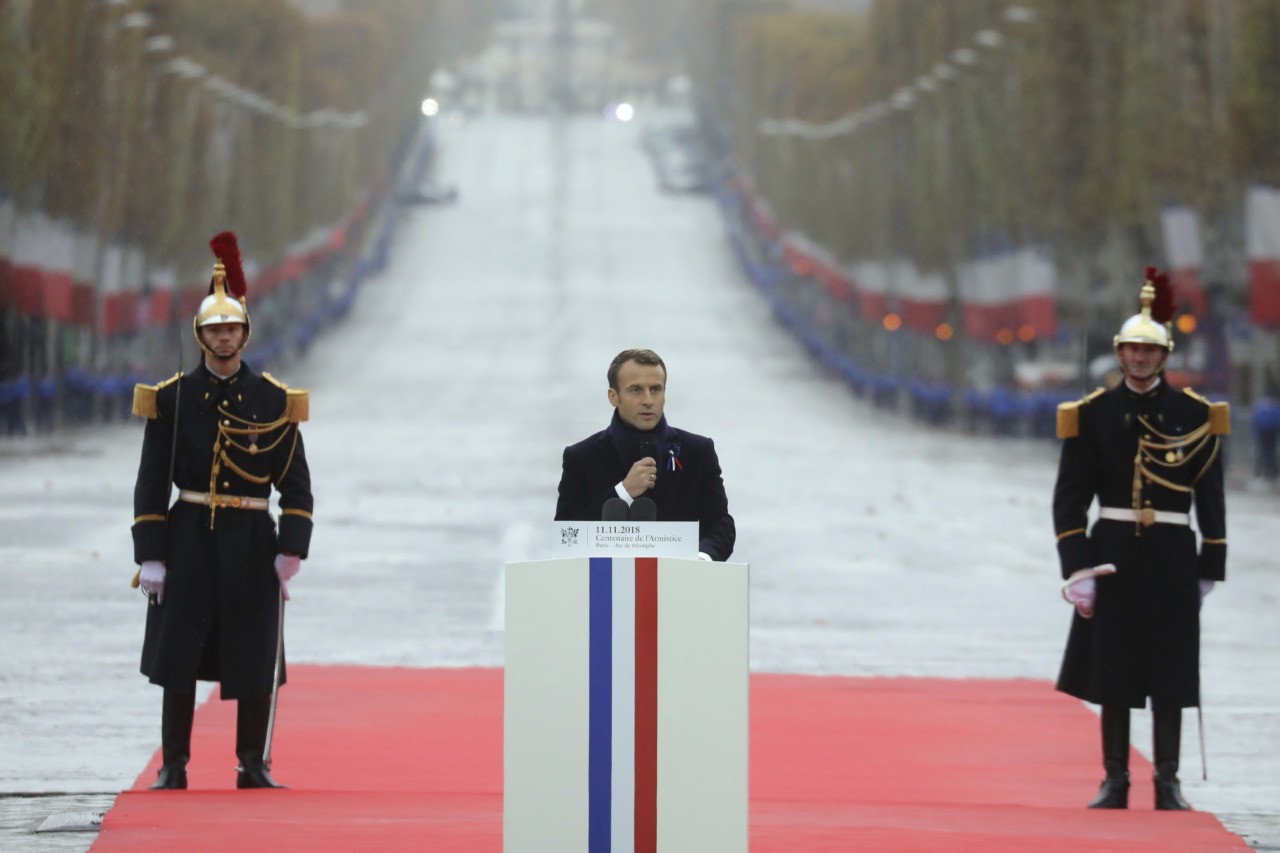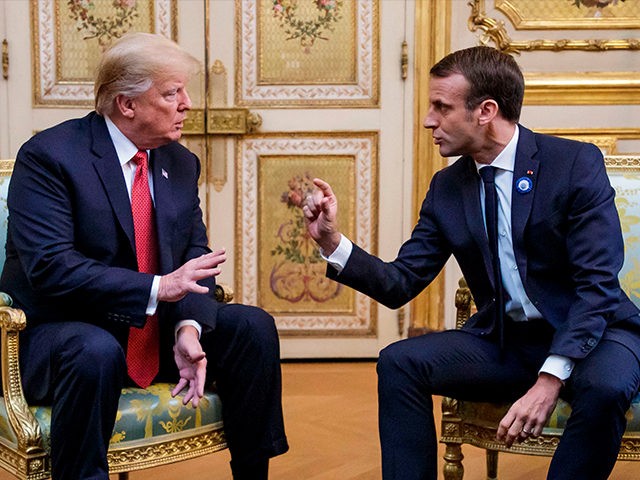Emmanuel Macron, the president of France, is playing host to world leaders—and attacking one of them. Guess who?
As The Washington Post reported on Sunday, “In the shadow of a grand war memorial here, French President Emmanuel Macron marked the 100th anniversary of the end of World War I by delivering a forceful rebuke against rising nationalism, calling it a ‘betrayal of patriotism’ and warning against ‘old demons coming back to wreak chaos and death.’” For much of Sunday, that article was the “Most Read” story on the Post’s website—of course it was.

French President Emmanuel Macron delivering a speech on November 11, 2018, during a ceremony at the Arc de Triomphe in Paris as part of the commemorations marking the 100th anniversary of the November 11, 1918 armistice, ending World War I. Macron used the occasion to rebuke President Trump’s embrace of nationalism and his America First stance, asserting instead that “nationalism is a betrayal of patriotism.” (Ludovic Marin/Pool Photo via AP)
Obviously Macron was aiming his rebuke at President Trump, who was sitting just a few feet away. After all, Trump said just three weeks ago, “I am a nationalist.” And so Macron further jibed on on Sunday, “Patriotism is the exact opposite of nationalism.”
The exact opposite? Really? The reader might be inclined to reach for a dictionary, in search of the difference between those two words, “patriotism” and “nationalism.” Actually, don’t bother, because they are, in fact, interchangeable.
Macron’s wordplay was dismissed by John O’Sullivan, who’s been a conservative sage since his days as an aide to Prime Minister Margaret Thatcher. O’Sullivan responded to Macron with a tart tweet, “Nonsense. Patriotism & nationalism overlap greatly as political ideas arising from love of country. Those who want to separate them fully get into linguistic difficulties & produce wildly differing definitions of both.” In other words, in his eagerness to zap Trump, Macron is splitting hairs.
Nonsense. Patriotism & nationalism overlap greatly as political ideas arising from love of country. Those who want to separate them fully get into linguistic difficulties & produce wildly differing definitions of both. Think: I'm a patriot, you're a nationalist, he's a chauvinist https://t.co/aQ7G8hrLOL
— John O'Sullivan (@JohnOSullivanNR) November 11, 2018
To be sure, plenty of folks will cheerfully defend nationalism, or patriotism, or both—including, just last month, Virgil–but there’s more to the story here than words. There’s also a struggle for power.
You see, even as Macron is zapping Trump for being a nationalist, the French president will be pushing, in Trump’s absence, a whole new initiative built around—you guessed it—globalism. As the Post also reported, “The president plans to fly home just as Macron’s Paris Peace Forum kicks off for three days of meetings aimed at galvanizing global action on shared challenges, such as climate change.” The Post quoted Thomas Wright, a Europe expert at the Brookings Institution, saying that Macron planned the Paris Peace Forum as “a counterpoint to ‘America First.’” Thus we can see: All the “Macron Attacks Trump” headlines are part of a deliberate strategy.
One might think that Macron would be better off tending to his own popularity in France. After all, he’s down to 29 percent approval, and his plan for a new green-inspired fuel tax is widely reviled; just this month he was roundly booed while visiting an auto factory.
Indeed, Macron has set his sights on a bigger prize than France; he wants to be the leader of the “international community.” Now that German chancellor Angela Merkel’s star has fallen, Macron figures that he can fill her shoes, rallying internationalists and scourging nationalists—starting with Trump.
So maybe we should take a closer look at Macron’s new venture, the Paris Peace Forum, which will be meeting through November 13. It even has its own website, dedicated to “reviving and improving global governance.” (No wonder Trump left.)
We can pretty much predict what this Paris conclave will be talking about; it will be mostly idealistic globaloney, except when the speaker needs a jolt of applause, in which case, it’ll be Trump-bashing.
So it might seem that there’s not much need to think about this conference further. Except for one thing: We can learn a lot by clicking on the Paris Peace Forum tab called “Partners.” There, we can learn who is paying for all this.
And with that click, we’ll see some familiar names. Under “Main Partners” and “Grand Partners,” we see such liberal reliables as the Carnegie Corporation, the Ford Foundation, the Rockefeller Foundation, and the Open Society Foundations. That last group, of course, is the outfit founded and funded by George Soros; just in 2017, he gave his philanthropic tool another $18 billion. So we can see: Macron has done a great job of rounding up the usual suspects of limousine liberalism.
Moreover, the Silicon Valley tech lords are well represented, too, starting with Facebook. It was just last year, after all, that CEO Mark Zuckerberg published a manifesto aimed at saving the world, and so the Facebook reps in Paris should be rapturously received. Google and Microsoft are partners, too, making it a safe bet that the words coming from the Paris meeting will include no meaningful criticism of Big Tech.
Indeed, a further look shows that the Paris Peace Forum has received donations from a large number of multinational corporations, banks, and law firms. Yes, there’s a lot of money gathered in the City of Lights; after all, globalism isn’t just a utopian ideology, it’s also a big business. And, of course, the media are well represented, too; one such partner is The New York Times.
Yet it’s also interesting to see that many of the partners are international organizations. Yup, there are a bunch of ‘em, including the International Energy Agency, the International Monetary Fund, and the Organization for Economic Cooperation and Development.
Also noteworthy are the many United Nations entities, including the International Labor Organization, the United Nations Development Programme, and UNESCO.
What’s particularly interesting here, as well, is that American taxpayers are paying much of the freight for all these groups. It’s not surprising, of course, that globalcrats want more institutional “turf.” And yet it is startling to contemplate how much of this turf-building is being paid for by the U.S.
For example, the annual budget for the U.N. is about $2.7 billion, of which the U.S. pays 22 percent, or $600 million. And yet as the Council of Foreign Relations—no enemy of the U.N.—reported last year, there are plenty of U.N. side programs that the U.S. contributes to as well, including food and peacekeeping missions. Thus the actual American outlay, in 2016, was more than $10 billion.
So the Paris Peace Forum will consist, in part, of global organizations teaming up with Macron to grow still more global governance, while Uncle Sugar foots much of the bill.
You, dear reader, probably aren’t a fan of what they are doing in Paris. But even so, you might as well at least check the twitter feed.
After all, you’re helping to pay for it.

COMMENTS
Please let us know if you're having issues with commenting.